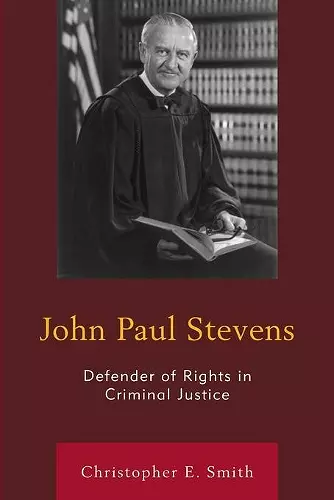John Paul Stevens
Defender of Rights in Criminal Justice
Format:Paperback
Publisher:Bloomsbury Publishing PLC
Published:28th Jul '17
Currently unavailable, and unfortunately no date known when it will be back

This book examines the judicial opinions and criminal justice policy impact of Justice John Paul Stevens, the U.S. Supreme Court’s most prolific opinion author during his 35-year career on the nation’s highest court. Although Justice Stevens, a Republican appointee of President Gerald Ford, had a professional reputation as a corporate antitrust law attorney, he immediately asserted himself as the Court’s foremost advocate of prisoners’ rights and Miranda rights when he arrived at the Court in 1975. In examining Justice Stevens’s opinions on these topics as well as others, including capital punishment and right to counsel, the chapters of the book connect his prior experiences with the development of his views on rights in criminal justice. In particular, the book examines his relevant experiences as a law clerk to Justice Wiley Rutledge in the Supreme Court’s 1947 term, a volunteer attorney handling criminal cases in Illinois, and a judge on the U.S. court of appeals to explore how these experiences shaped his understanding of the importance of rights in criminal justice. For many issues, such as those affecting imprisoned offenders, Justice Stevens was a strong defender of rights throughout his career. For other issues, such as capital punishment, there is evidence that he became increasingly protective of rights over the course of his Supreme Court career. The book also examines how Justice Stevens became increasingly important as a leading dissenter against the diminution of rights in criminal justice as the Supreme Court’s composition became increasingly conservative in the 1980s and thereafter. Because of the nature and complexity of Justice Stevens’s numerous and varied opinions over the course of his lengthy career, scholars find it difficult to characterize his judicial philosophy and impact with simple labels. Yet in the realm of criminal justice, close examination of his work reveals that he earned a reputation and an enduring legacy as an exceptionally important defender of constitutional rights.
For far too long, scholarship on the Supreme Court of the United States has lacked a systematic assessment of the jurisprudence and impact of Justice Stevens across a range of legal issues. Fortunately, Professor Smith not only answers this call, he does so with an engaging style that does not sacrifice nuance or intellectual rigor. Smith employs multiple lenses to reveal Stevens’s fact-based, case-by-case approach to considering questions regarding Miranda rights, jury trials, search and seizure protections, and capital punishment. The author’s informative, personal interviews with the justice complement illuminating discussions of Stevens’s earlier experiences and detailed analyses of the jurist’s later opinions on the Supreme Court. The result is a rich depiction of Stevens’s criminal justice jurisprudence as complex and consistent, without being ideologically reflexive. As the definitive examination of one of the Court’s most influential members in cases addressing the rights of prisoners and of the criminally accused, John Paul Stevens: Defender of Rights in Criminal Justice deserves a prominent place on the bookshelf for those interested in criminal justice, constitutional interpretation, or public law. -- Madhavi M. McCall, San Diego State University
Chris Smith, one of the foremost scholars of legal issues in criminal justice, has produced an important, path-breaking work on Justice John Paul Stevens, one of the least studies and least understood of recent Supreme Court justices. During his more than thirty years on the Supreme Court, Justice Stevens wrote important opinions dealing with virtually every aspect of the criminal justice system, including the death penalty, prisoners’ rights, search and seizure law, and the right to counsel. This book provides a comprehensive, yet clear and well-documented analysis of Justice Stevens’ approach to constitutional rights in criminal justice. Legal scholars and students of the law and criminal justice will benefit tremendously from reading this book. -- Craig Hemmens, Washington State University
A thoroughly engaging and informative analysis that illuminates the rights-protective approach to criminal justice that animated Stevens’s decision making on both the 7thCircuit Court of Appeals and the Supreme Court. Throughout the text, Smith deftly weaves insights from his interviews with the justice, providing examples of specific life experiences that helped to shape Stevens’s views on particular issues. A must-read for scholars and anyone interested in learning more about the complex judicial philosophy of one of the most consequential justices of the contemporary Supreme Court era. -- Joyce A. Baugh, Central Michigan University
ISBN: 9781498523752
Dimensions: 232mm x 150mm x 24mm
Weight: 454g
326 pages